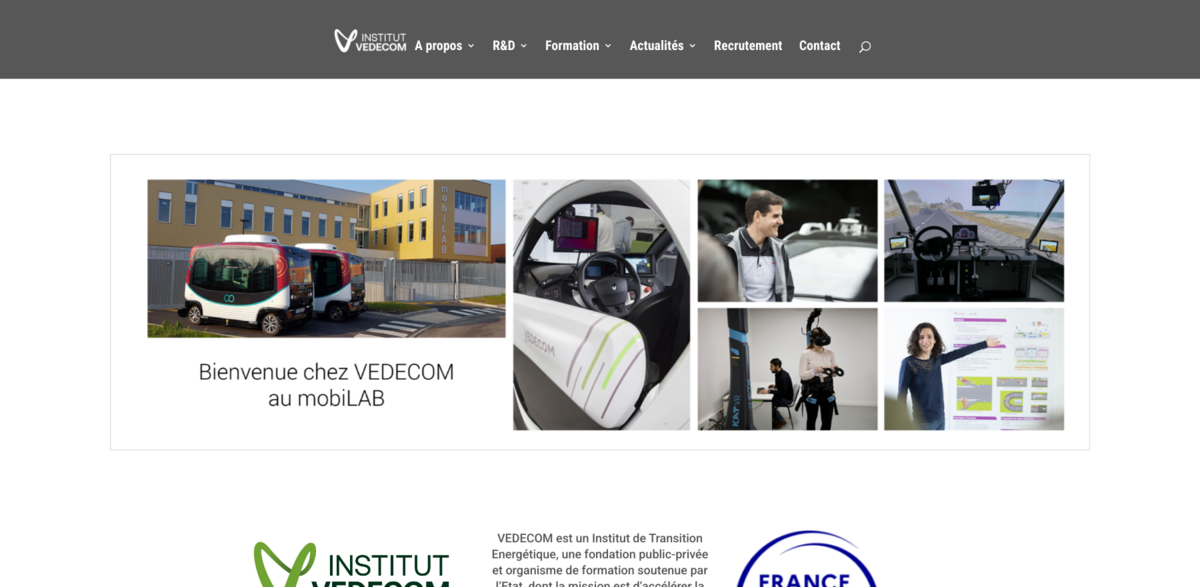Introducing VEDECOM: Pioneering Sustainable Mobility
VEDECOM is an Institute for Energy Transition – a public-private foundation and training organization supported by the State – whose mission is to accelerate the transition towards sustainable mobility by acting on mobility systems and usage. In a world that is constantly evolving, VEDECOM stands out as a leader, driving innovations in future mobility… This initiative is not only a hub for research but also an active participant in the national network of the 15 FIT institutes dedicated to public-private research. The Institute, deeply embedded in the dynamic landscape of energy and sustainability, has been nurturing groundbreaking ideas since its foundation. It is also known for its vital role in promoting initiatives that are at the heart of tomorrow’s mobility – sustainable, autonomous, and shared.
Key Benefits and Facts
- Smart City Expo World Congress: Scheduled for November 4–6, 2025 in Barcelona, Spain – an event that explores tomorrow mobilities, innovative technologies, energy and environment to showcase real advancements in infrastructure, governance, living inclusion, blue economy, and more.
- University Gustave Eiffel Partnership: As a historical partner and founding member since 2014, L’Université Gustave Eiffel has strengthened its commitment in 2025 by becoming the bearer of the VEDECOM partnership foundation. This marks a key evolution, cementing the bridge between academic expertise and practical innovation.
- Autonomous Shuttle “Citron”: VEDECOM recently announced the donation of one of its autonomous shuttles, the first-generation EZ GEN1 named Citron, to RATP – a significant step in integrating innovative technology with existing public transportation systems.
- 5 Strategic R&D Programs: Organized around a bouquet of R&D projects, VEDECOM supports strategic programs in areas such as Electro-mobility and energy optimization, Automated vehicles, Data, and Connected infrastructure, Attractive and Inclusive multimodal mobilities, Impact analysis of mobilities, and the Light vehicle intermediary sector.
Innovative Partnerships and Alliances
The collaboration and synergy between multiple stakeholders is at the core of VEDECOM’s vision. With the recent evolution where L’Université Gustave Eiffel becomes the bearer of the VEDECOM partnership foundation, it reflects a shared desire to foster deep-rooted, long-term alliances that drive research and development. This move reinforces the relevance of historical partners and highlights an enduring commitment to innovation, as seen by the Institute’s integral role since its inception. The spirit of partnership extends to its association with the national research network, ensuring that the contributions of public and private sectors continue to feed into future mobility solutions.
Advancements in Smart Mobility
VEDECOM’s work is as dynamic as it is groundbreaking, weaving together diverse elements of smart mobility. A prime example is the contribution to the Smart City Expo World Congress, scheduled in Barcelona, Spain, which will assemble experts to deliberate over Tomorrow Mobility, Technologies, Energy & Environment, Governance & Economy, and more. Such a convergence of ideas and technology puts VEDECOM at the forefront of progressing multiple dimensions of smart mobility – helping to create living, inclusive, and connected urban spaces. Innovations here are not confined to R&D; they are pushing the envelope on user experience and system integration.
Emerging Technologies in Transportation
Among the bold initiatives, the autonomous shuttle named Citron marks a revolutionary step forward. The shuttle’s integration into the RATP rolling stock reserve demonstrates a clear commitment to embedding advanced technology within traditional transit frameworks. This move is a tangible example of how sophisticated technology meets everyday urban mobility needs, creating a seamless blend of tradition and innovation. Every detail, from the underlying technology to the real-world applications, reinforces what is already a well-grounded belief in the potential of automated vehicles and connected infrastructure.
Project Impact on Global Goals
- SDG 7 (Affordable and Clean Energy): The Institute’s focus on energy optimization contributes to more efficient and cleaner energy use in mobility systems.
- SDG 9 (Industry, Innovation, and Infrastructure): Significant investments in R&D and strategic programs foster rapid innovation, reinforcing resilient infrastructures.
- SDG 11 (Sustainable Cities and Communities): Through initiatives such as smart mobility and inclusive multimodal systems, the project plays a crucial role in shaping sustainable urban environments.
- SDG 13 (Climate Action): The transition towards sustainable, energy-optimized mobility solutions directly contributes to mitigating climate change impacts.
- SDG 17 (Partnerships for the Goals): The longstanding and evolving partnerships, notably with University Gustave Eiffel, highlight the importance of robust alliances in achieving sustainability objectives.
The Road Ahead: Shaping Tomorrow’s Mobility
The future of mobility is being actively rewritten by institutions like VEDECOM, whose path is paved with innovation, collaboration, and a commitment to sustainability. With initiatives like the Smart City Expo World Congress, engagement with prestigious educational institutions, and groundbreaking projects such as the autonomous shuttle Citron, the Institute is not just keeping pace with change – it is driving it. The integration of advanced strategies and real-world applications serves as a bridge between visionary ideas and tangible solutions. As urbanization accelerates and technological capabilities expand, the holistic approach adopted by VEDECOM offers promising insights into how mobility systems can evolve. A blend of classic methodologies with fresh, forward-thinking strategies ensures that tomorrow’s mobility is not just a dream, but an impending reality… paving the way to a cleaner, more inclusive future.


















